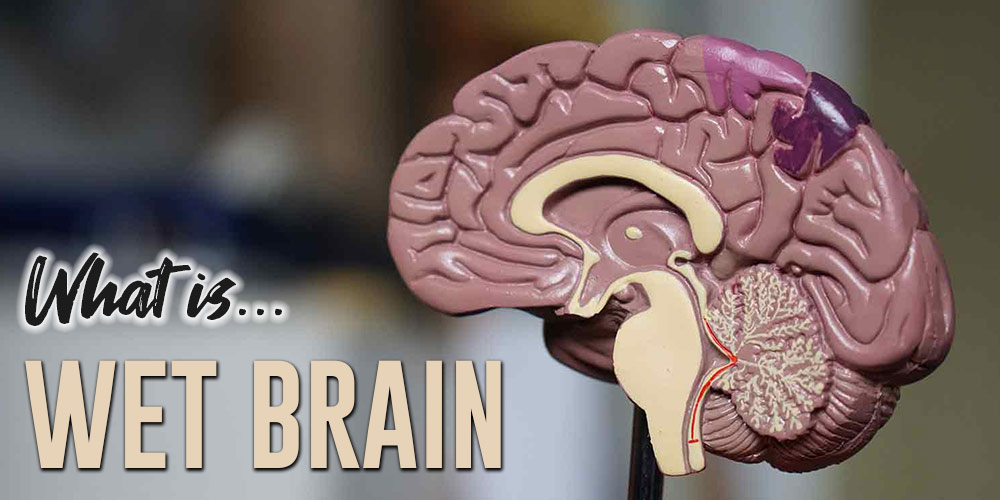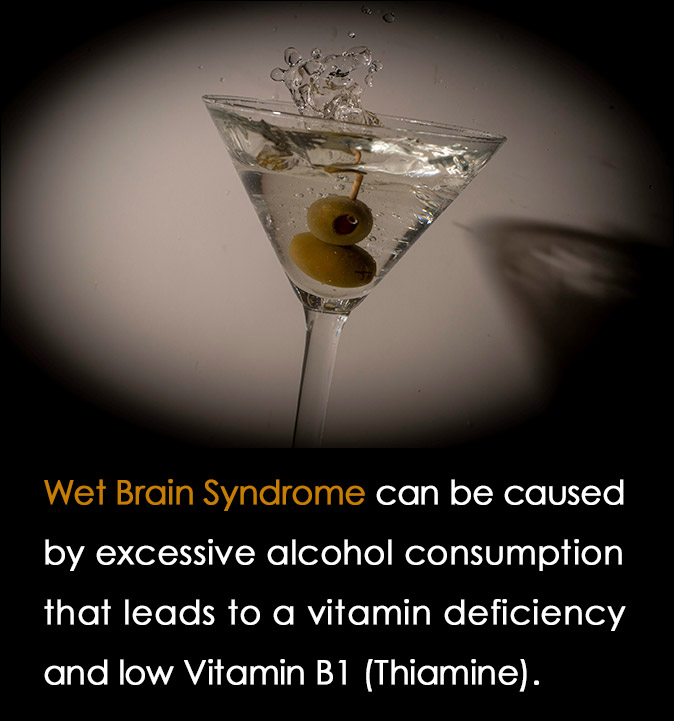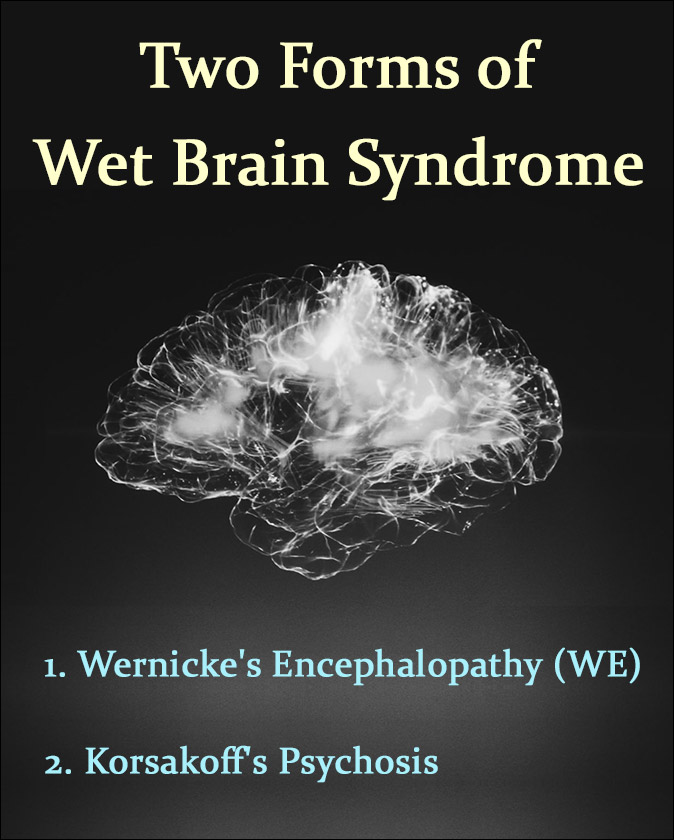
Wet Brain Syndrome, also known as Wernicke-Korsakoff Syndrome (WKS), is a severe condition that occurs due to nutrient deficiencies from the long term effects of alcohol on the brain and body.
Millions of Americans misuse alcohol every year. According to the National Institute on Alcohol Abuse and Alcoholism (NIAAA) approximately 9.8 million men and 5.3 million women suffer from alcohol use disorder and heavy drinking.
What is Wet Brain Syndrome?
Wet Brain is a type of brain damage caused by excessive alcohol consumption that is related to a thiamine (Vitamin B1) deficiency.
Drinking alcohol to excess damages the liver, and in turn, the body cannot absorb enough thiamine, which is consumed from the diet and stored in the liver. Many essential neurotransmitters in the brain require the vitamin to function correctly.
Autopsies have uncovered that nearly 13% of alcoholics have symptoms of Wernicke’s Encephalopathy, Including lesions on the brain, but sadly 20% of these patients were not diagnosed with Korsakoff Syndrome prior to their death.

How Does Alcohol Use Contribute to Malnutrition?
You’ve heard it before, drinking alcohol results in “empty calories,” because there are no proteins, nutrients or vitamins in alcohol. In fact, alcohol inhibits the absorption of zinc, folic acid, Thiamine, and vitamin B12.
Alcohol is a diuretic, and as such encourages the decrease of water-soluble minerals like zinc, magnesium, and potassium. The severity of malnutrition from alcohol differs between social groups.
Alcohol can also encourage intestinal permeability (leaky gut) which means that nutrients can leak into the blood, rather than being absorbed in the intestine.
What is Thiamine?
Thiamine is a vitamin, also known as Vitamin B1. The human body cannot produce thiamine so it must consume it from food in the diet.
According to the NIAAA, humans require 0.33 milligrams (mg) of the vitamin for every 1,000 kilocalories (kcal) of energy they consume. Currently 1.1 mg of the nutrient is recommended for women and 1.2 mg for adult men.
Thiamine is predominant in the skeletal muscles and in the heart, liver, kidney, and brain. Thiamine is also required for several biochemical reactions in the body including the synthesis of neurotransmitters.
The nervous system and the heart are sensitive to low thiamine levels. In the brain, it is essential for nerve cells, enzymatic reactions, and glial cells to function properly.
Other than Korsakoff Syndrome, thiamine deficiency is linked to other alcohol-induced brain injuries, including alcohol dementia.
In affluent countries like the United States, thiamine deficiency is clearly linked to alcoholism, with up to 80% of those misusing alcohol also being deficient in the vitamin.

Vitamin B1 Thiamine Rich Foods
- Oranges
- Oats
- Legumes
- Nuts
- Seeds
- Brown rice
- Bran
- Asparagus
- Soy foods
- Pork
- Salmon and other fish
Two Forms of Wet Brain
Wernicke-Korsakoff syndrome can be categorized into two separate conditions:
- Wernicke’s Encephalopathy (WE)
- Korsakoff’s Psychosis
What is Wernicke’s Encephalopathy?
Wernicke’s Encephalopathy (WE) is a short-lived and severe illness that causes neurological symptoms due to biochemical lesions in the nervous system.
The most common areas of the brain to be affected are the thalamus and hypothalamus, which are responsible for memory.
What is Korsakoff’s Psychosis?
Korsakoff’s Psychosis occurs after Wernicke’s encephalopathy symptoms ease. Korsakoff’s psychosis is a form of permanent brain damage caused by severe alcoholism after many years of drinking alcohol.
Signs and Symptoms of Wet Brain
As discussed there are two forms of the condition – “Wernicke’s Encephalopathy” and “Korsakoff’s Psychosis.” The wet brain symptoms a person experiences will depend on the type of syndrome they have.
Wernicke’s Encephalopathy Symptoms Include:
- Impaired cognitive ability
- Confusion
- Memory problems
- Memory loss
- Ataxia – Loss of muscle coordination
- Changes in Vision
Data from the National Organization for Rare Disorders (NORD) states that 80% to 90% of people with Wernicke Encephalopathy (WE) syndrome develop Korsakoff psychosis.
Korsakoff’s Psychosis Symptoms
Korsakoff’s Psychosis symptoms appears as severe damage to memory and usually include:
- Problems learning new information
- Inability to recall recent events
- Might fabricate missing pieces of information in a story

How Common is Wet Brain Syndrome?
It’s hard to put a figure on the number of people who currently suffer from wet brain or Korsakoff Syndrome. As discussed, the illness is often not diagnosed until after death.
The National Organization for Rare Disorders (NORD) has determined that WKS affects more males than females and occurs in 1% to 2% of the population.
Is Wet Brain Syndrome Reversible?
Significant recovery can be made from wet brain symptoms if caught early.
An alcohol detox treatment program is always recommended as the safest and most effective way for a person to quit drinking after years of chronic alcohol use.
Treatment for wet brain typical includes:
- Abstinence from all forms of alcohol
- Intravenous thiamine therapy
- Psychotherapy
When a person quits drinking altogether, alcohol withdrawal dehydration is always a concern so it’s important to be under the care of a detox treatment specialist.
Intravenous thiamine is required for people who have impaired gut function.
For some, taking a strong oral supplement to boost thiamine levels is enough to sufficiently increase levels to notice some healing.
In other cases, where the neurological impairment is severe, memory and gait may remain permanently impaired.
Is Wernicke-Korsakoff Syndrome Permanent?
Korsakoff Syndrome can create permanent damage to the brain, cause patients to lapse into a coma, or even death. A person with WKS will find it hard to interact socially and have issues walking, which can lead to other injuries.
Although WKS can be reversed if caught early, the majority go on to develop Korsakoff’s Psychosis. Only 10% to 20% of people with Wernicke’s Encephalopathy will be able to turn things around.
Considering the devasting effects of wet brain, it’s never too early to stop drinking and seek treatment options for alcohol addiction. Many people wish they had reached out and asked for help sooner.
FAQs
What is the Life Expectancy of a Person with Wet Brain Syndrome?
The life expectancy of a person with wet brain syndrome can vary depending on the individual and the severity of their condition.
Without treatment, the prognosis for those with the condition can be quite grim, with many suffering from debilitating neurological and physical symptoms.
However, with proper treatment and management, some individuals with wet brain can live for many years.
The key to improving life expectancy for those with wet brain is early detection and intervention, which may involve vitamin supplementation, therapy, and lifestyle changes.
It is important for individuals with wet brain to seek medical help as soon as possible to increase their chances of living a longer and healthier life.
Ultimately, the life expectancy of a person with wet brain is influenced by a variety of factors, and it is important for those affected to work closely with healthcare professionals to manage their condition and improve their overall well-being.
Is Brain Impairment from Alcohol Addiction Reversible?
Brain impairment from heavy or long-term alcohol misuse may be reversible to some extent.
Research has shown that the brain has the ability to heal and rewire itself, even after prolonged alcohol abuse.
However, the extent of reversibility depends on factors such as the severity of the damage and the individual’s overall health.
Seeking professional help and abstaining from alcohol can help to minimize further damage and improve the chances of rehabilitation for those suffering from alcohol-related brain damage.
What is the First Stage of Wernicke-Korsakoff Syndrome?
The first stage of wet brain syndrome is usually characterized by Wernicke’s Encephalopathy, which includes symptoms such as confusion, ataxia, and nystagmus.
This phase is often due to a thiamine deficiency, which can lead to structural damage in the brain.
If left untreated, this initial phase can progress to Korsakoff syndrome, which encompasses severe memory loss and confabulation. It is crucial to recognize and address the first stage of Wernicke-Korsakoff syndrome to prevent further neurological decline.
Related Posts
- Effects of Alcohol on the Body and Brain
Even though alcohol consumption is widely accepted in society, there are many negative side effects…
- Alcohol Blackout Drunk Causes, Dangers, Prevention
Ever been blackout drunk or had an alcohol blackout? That is, have your memories after…
- Alcohol Dementia Causes, Symptoms and Treatment
Note: Alcohol Dementia goes by many names including, alcohol-related dementia, alcoholic dementia, and alcohol-induced dementia.…
